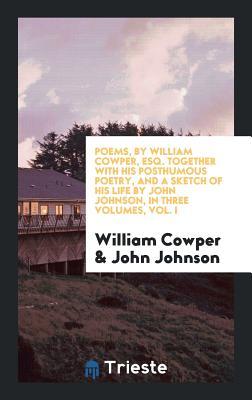- Bible
- Read the Bible
- Bible Versions
- Verse of the Day
- Reading Plans
- Verses by Topic
- Books of the Bible
- Bible Images
- Study
- Commentaries
- Concordances
- Dictionaries
- Encyclopedias
- Sermons
- Bible Atlas & Maps
- BP Wiki
- Devotionals
- Today's Devotionals
- Light of the World
- All Devotionals
- Inspirational Quotes
- More
- Picture Quotes
- Videos
- Inspirational
- Bible Study
- What The Bible Says
- Bible Q&As
- Daily Bread
- Bible by Genre
- Bible Stories
- Random Bible Verse
- Community
- Store
Poems, by William Cowper, Esq. Together with His Posthumous Poetry, and a Sketch of His Life by John Johnson, in Three Volumes, Vol. I
by William Cowper
Trieste Publishing has a massive catalogue of classic book titles. Our aim is to provide readers with the highest quality reproductions of fiction and non-fiction literature that has stood the test of time. The many thousands of books in our collection have been sourced from libraries and private collections around the world.The titles that Trieste Publishing has chosen to be part of the collection have been scanned to simulate the original. Our readers see the books the same way that their first readers did decades or a hundred or more years ago. Books from that period are often spoiled by imperfections that did not exist in the original. Imperfections could be in the form of blurred text, photographs, or missing pages. It is highly unlikely that this would occur with one of our books. Our extensive quality control ensures that the readers of Trieste Publishing's books will be delighted with their purchase. Our staff has thoroughly reviewed every page of all the books in the collection, repairing, or if necessary, rejecting titles that are not of the highest quality. This process ensures that the reader of one of Trieste Publishing's titles receives a volume that faithfully reproduces the original, and to the maximum degree possible, gives them the experience of owning the original work.We pride ourselves on not only creating a pathway to an extensive reservoir of books of the finest quality, but also providing value to every one of our readers. Generally, Trieste books are purchased singly - on demand, however they may also be purchased in bulk. Readers interested in bulk purchases are invited to contact us directly to enquire about our tailored bulk rates.
BUY NOW
Paperback, 256 pages
Published May 28th 2018 by Trieste Publishing
© 2025 Bibleportal.com All rights reserved.

William Cowper was an English poet and hymnodist. One of the most popular poets of his time, Cowper changed the direction of 18th century nature poetry by writing of everyday life and scenes of the English countryside. In many ways, he was one of the forerunners of Romantic poetry. Samuel Taylor Coleridge called him "the best modern poet", whilst William Wordsworth particularly admired his poem 'Yardley-Oak'.
Cowper suffered from severe manic depression, and although he found refuge in a fervent evangelical Christianity, the inspiration behind his much-loved hymns, he often experienced doubt and feared that he was doomed to eternal damnation. His religious sentiment and association with John Newton (who wrote the hymn "Amazing Grace") led to much of the poetry for which he is best remembered.
William Cowper was an English poet and hymnodist. One of the most popular poets of his time, Cowper changed the direction of 18th century nature poetry by writing of everyday life and scenes of the English countryside.
He was born in Berkhamsted, Hertfordshire, England. After education at Westminster School, he was articled to Mr. Chapman, solicitor, of Ely Place, Holborn, in order to be trained for a career in law.
Later he settled at Huntingdon with a retired clergyman named Morley Unwin and his wife Mary. Cowper grew to be on such good terms with the Unwin family that he went to live in their house, and moved with them to Olney, where John Newton, a former slave trader who had repented and devoted his life to the gospel, was curate. At Olney, Newton invited Cowper to contribute to a hymnbook that Newton was compiling. The resulting volume known as Olney Hymns was not published until 1779 but includes hymns such as "Praise for the Fountain Opened" (beginning "There is a fountain fill'd with blood") and "Light Shining out of Darkness" (beginning "God moves in a mysterious way") which remain some of Cowper's most familiar verses. Several of Cowper's hymns, as well as others originally published in the "Olney Hymns," are today preserved in the Sacred Harp.
Cowper was seized with dropsy in the spring of 1800 and died in East Dereham, Norfolk.
... Show more